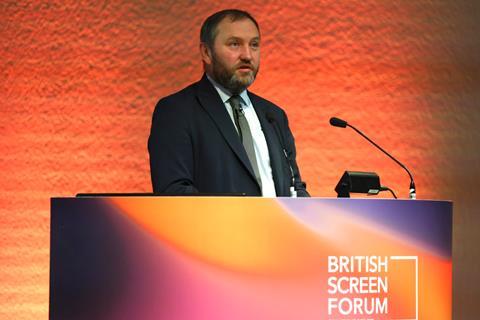
Ian Murray, the UK’s creative industries minister, has said he wants to make “createch as high profile as fintech” through a series of measures to improve access to finance for the creative industries.
Murray took over from Chris Bryant in a government reshuffle in September.
“We understand that supporting the sector’s long-term growth means rapidly improving access to finance for creative businesses and IP owners,” he said at the annual conference of the British Screen Forum in London on November 19.
”That is why we’re increasing support for the British Business Bank, establishing a working group to support IP-backed lending, and working with industry to create a single front door for investment gains.”
Earlier this year, the British Business Bank committed an additional £4bn to support investment and growth in the government’s eight target sectors for growth, which includes the creative sector.
Exactly how that £4bn will be divided between the eight sectors, which also includes defence, clean energy, financial services, life sciences, digital and technologies, advanced manufacturing and professional and business services, is yet to be established.
The British Business Bank is a government-owned development bank set up in 2014 to help businesses in the UK access financial support.
“A number of producers I’ve spoken to over recent days have told me they have only been able to be successful by the ability of having assets like homes to put up for collateral,” Murray noted,
He later continued, “Part of the sector plan [a plan for the creative industries by the UK government published in June] is about changing the dynamic away from creators having to put up assets, and getting the financial services sector to realise that the creative industries are something that they can invest in. Do they understand it? Not sure. Do they understand it as much as bricks and mortar? Definitely not. Do they understand it more than manufacturing? Definitely not.
“But if we can get to the position that the British Business Bank can look at IP, look at those creatives, and say, actually, we can back it on that basis, rather than taking your house from you, I think that will help the ecosystem and de-risk.”
“We have to save the BBC”
Murray also threw his support behind the BBC, in the wake of the resignations of BBC director general Tim Davie – who was due to speak at the conference but pulled out earlier this week – and the CEO of BBC News Deborah Turness. The resignations follow misleading edits made to a speech by US president Donald Trump in a Panorama documentary and aired in October 2024, shortly before Trump was re-elected.
Trump has said he is pursuing legal action against the BBC for between $1bn and $5bn. The BBC’s charter is renewed on a 10-year basis, with the current cycle ending on December 31 2027.
“Events over the last week or so, even the last year or so, have reminded us about the responsibility that the BBC has to uphold the highest editorial standards,” said Murray. “But the public and parliamentarians have also shown their support for a fiercely independent BBC that continues to provide trusted and truthful news in an age of mis-and-disinformation.
“This government, and me as the minister, through charter review, will ensure the BBC can remain independent and accountable to the public it serves, while also continuing to drive growth, good jobs, skills and creativity across the UK, and being at the centre of that screen ecosystem.”
He stressed the role the BBC plays across the entire UK production eco-system: “From my perspective, from the secretary of state’s [perspective], we have to save the BBC. There isn’t a rival television channel, a streamer, an independent production company that hasn’t come up to me in the last few months and said, ’we back the BBC, we need the BBC’. The whole industry needs the BBC, particularly in this age, to be right at the heart of the ecosystem, developing the ecosystem, doing stuff the industry commercially can’t do, and partnering with the industry in making sure that ecosystem works.
“The BBC is so important for public life and has been for 100 years. We lose it at our peril, and be under no illusion that lots of people out there want to see it go, because they’d rather have Fox News than BBC One or BBC News. If we go down that route, our national story will never be told properly.”
Murray joined the DCMS from his role as Scotland secretary. His predecessor, Chris Bryant, is now the minister for international trade and economic security at the Department for Business and Trade. Lisa Nandy remains culture secretary.

























No comments yet